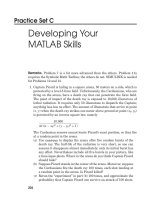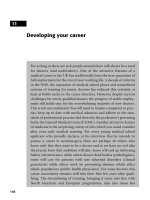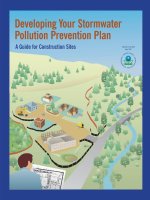Developing your career
Bạn đang xem bản rút gọn của tài liệu. Xem và tải ngay bản đầy đủ của tài liệu tại đây (413.97 KB, 13 trang )
11
Developing your career
143
For as long as there are sick people around there will always be a need
for doctors (and undertakers). One of the attractive features of a
medical career in the UK has traditionally been the near-guarantee of
full employment for the rest of your working life. A decade of reforms
in the NHS, the expansion of medical school places and streamlined
systems of training for junior doctors has reduced this certainty at
least at bottle necks in the career structure. However, despite current
challenges for newly qualified doctors the prospect of stable employ-
ment still holds true for the overwhelming majority of new doctors.
This is not unconditional. You will need to remain competent to prac-
tise, keep up to date with medical advances and adhere to the stan-
dards of professional practice laid down by the profession’s governing
body, the General Medical Council (GMC). Another attractive feature
of medicine is the surprising variety of jobs which you could consider
after your early medical training. For every young medical school
applicant who proudly declares at his interview that he intends to
pursue a career in neurosurgery, there are perhaps 20 others who
know only that they want to be a doctor and as yet have no real idea
the precise form that ambition will take. Some will end up delivering
babies (obstetricians) while others dissect dead bodies (pathologists),
some will care for patients with rare inherited disorders (clinical
geneticists) while others work on preventing diseases which affect
whole populations (public health physicians). For some doctors, this
career uncertainty remains well into their first few years after quali-
fying. The streamlining of training, bringing it more into line with
North American and European programmes, may also mean less
The career path
While it is apparent that many new doctors are keen to find innovative ways
of developing their career, the “powers that be” (the Department of Health,
the Postgraduate Medical Education Training Board, the GMC, and the med-
ical Royal Colleges) have increasingly tried to create more structured training
and consistent quality of experience for junior doctors. More systematic
training with better supervision, assessment of the skills being developed,
144 Learning medicine
flexibility than before as new doctors have to commit to career choices
earlier on. However, doctors being as they are, no doubt those deter-
mined enough to plough their own furrow will soon find ways of
doing so while still progressing their career.
and documentation of the outcomes of each doctor’s learning actually allows
a degree of flexibility that the old-fashioned “just serve your time and watch
me” apprenticeships of former generations lacked. Reforms have been insti-
tuted at almost every grade of the medical hierarchy and in all specialities and
these will continue to evolve.
A specialist indeed!
Every doctor becomes a specialist, even in something as general sounding as
general practice, perhaps better called Family Medicine (as in the USA),
which is as much a special art as any other part of medical practice. Becoming
a specialist may not seem that difficult, judged from recent cases of bogus
doctors who have remained undetected for years. A 64-year-old man with a
stolen medical degree was sentenced at Leeds Crown Court after working
for 30 years as a general practitioner (GP). Amazingly, neither his patients
(some of whom demonstrated outside the court house in his support), nor
his colleagues rumbled him. A pharmacist in the chemist’s shop next door
to the surgery raised the alarm, not perhaps before time. “If one 5 millilitre
spoonful of hair shampoo is to be taken orally three times a day”, the phar-
macists told the court, “You tend to think something is wrong. Time and
again there were inhalers to be injected, tablets to be rubbed in, all very
unusual”. Very unusual!
General practice is not the only home of bogus doctors. Amaedeo Goria
of Canelli near Turin practised for 13 years as a neurologist before he was
“unwittingly betrayed by his adoring wife after telling her one lie too many
about his professional prowess”. She passed on to a local newspaper his story
that he had brilliantly passed an examination in Rome, which qualified him
to become head of the neurology department at the local hospital. This news
sparked off an enquiry which revealed to the contrary that he was a failed
medical student who had forged his diploma. It could be said that both the
public and profession need their gullible heads examined, but they would
be wise to take care over who does it. About the same time as Signor Goria
was unmasked, another failed medical student in Italy was discovered, not
because of clinical incompetence but because of “corruption in appointing
senior medical personnel”. He had practised for 10 years as a neurosurgeon
without detection.
145 Developing your career
Postgraduate medical education
The Postgraduate Medical Education and Training Board in conjunction
with the medical Royal Colleges and related specialist faculties determine
the standards of practice and education in the specialities. They inspect and
assess both training programmes and placements in conjunction with the
Postgraduate Deanery of the local university. A syllabus outlines the broad
areas of knowledge, skills and attitudes required. Regular assessments by
consultants nominated as clinical supervisors or tutors check the doctor’s
progress. Examinations for membership or fellowship of a Royal College
are taken, now as part of specialist training. Many doctors also take a higher
university degree – MD or DM (Doctor of Medicine) awarded for a disser-
tation which is usually based on clinical research in the course of postgrad-
uate training. Increasingly many other doctors are undertaking Masters
level degrees (Master of Science, Master of Public Health, Master of
Surgery, or even Masters in Law or Business Administration) at some point
in their career either as part of their training or to pursue a related interest
later in their career. There are also a host of diplomas which can be taken
from various medical Royal Colleges or universities. This is common
amongst many GPs who may want to supplement their family practice with
a specialist interest in say Child Health, Family Planning, Dermatology or
Geriatric Medicine.
Improving working lives
Medicine as a career in the UK is inextricably linked to the National Health
Service (NHS) which since its inception in 1948 has been, by far, the main
employer of junior doctors and of hospital consultants. A different arrange-
ment is in place for most GPs who are, in effect, self-employed but con-
tracted to provide a service by the NHS. The NHS must, however, continue
to be an attractive employment option for qualified doctors, particularly at
present where public demand for and commitment to the NHS is leading to
a significant expansion in the number of doctors needed across the country.
This is occurring at a time when an increasing number of doctors, mainly
but not exclusively women, are choosing to work part-time, at least for some
of their career. In addition the European Union’s employment directives are
146 Learning medicine
also forcing the NHS to be a more flexible employer, working for better
conditions for staff and encouraging better working conditions (including
shorter working hours) than was traditionally endured by most doctors,
particularly in their early careers. While it remains true that in many ways
being a doctor is more than just a job but a way of life, keeping medicine in
its place can be difficult. Dr Julian Eyers when a recent graduate referred to:
“… a public misconception that doctors are some sort of breed apart of
medical soldiers, ready to be drafted into any situation. Doctors are actually
human beings. They have loved ones, emotions, and outside lives”.
Not only a parent or carer or elderly relatives, but also the dedicated
sportsman, musician, or enthusiast for a full life may wonder whether an
otherwise attractive career would unacceptably monopolise their lives.
Given the structure of society and the traditionally predominant responsi-
bility of the mother for the family, many of the issues particularly affect
women in medicine, but increasing numbers of men have family responsi-
bilities too. And an increasing number of both genders just want to achieve
a better work-life balance.
Becoming a thoroughly fulfilled doctor is compatible with domestic com-
mitments provided both partners are prepared to fully share the task of
house and home. The trouble is that more than half of married doctors are
themselves married to doctors, with all the difficulty that entails, including
coordinating training programmes and eventually obtaining mutually com-
patible career posts. Past studies have shown that half of women and a quar-
ter of men considered marriage to have been a constraint on their career in
medicine. Eventually preconceived ambitions have to be balanced against
the practicalities of personal commitments and professional training. In
this, the medical profession is by no means unique.
To tackle some of these challenges, however, a programme known as
Improving Working Lives has been established. This aims to increase oppor-
tunities for flexible training schemes and flexible career development,
improve childcare provision, tackle discrimination and invest a diverse
workforce which better reflects the society it serves.
The Flexible Career Scheme for doctors (other than GPs who have a dif-
ferent although similar scheme) is designed to allow you to work part-time
and to afford some level of choice with how and when you work. Obviously
the NHS has to ensure that it is able to staff the service it needs to provide
147 Developing your career









